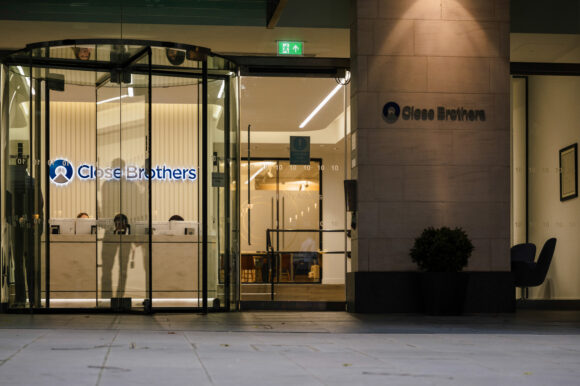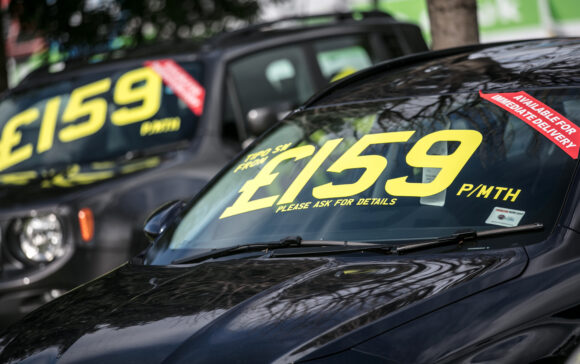A fight over UK motor finance and whether lenders should be on the hook for billions of pounds in compensation will play out at the Supreme Court in one of the most highly-anticipated hearings in years.
At stake, the scope of a huge compensation program for consumers who took loans to buy cars without knowing about the commission paid by lenders to dealers. Banks are bracing for a payout that could run as high as £38 billion ($49.1 billion) according to some estimates, if the top court’s judges rule against them. Investors are taking note.
In an unusually swift timeframe for the country’s top court, a panel of five judges will sit for three days this week to hear an appeal brought by Close Brothers Group Plc and South Africa-based FirstRand Ltd.
The hearing will take place less than six months after a lower court effectively ripped up historical consumer finance practices by declaring it unlawful for banks to pay commission to a car dealer without obtaining the customer’s informed consent.

Rulings in this case have shaken investors. Close Brothers shares have lost two thirds of their value since the first customers lodged appeals in July 2023, and banks including Lloyds Banking Group Plc have set aside increasing sums for a redress program.
Lloyds, the UK’s largest provider of car finance, has earmarked £1.15 billion so far for any potential payouts, while the UK arm of Spain’s Banco Santander SA has put aside £295 million. Close Brothers, where one-fifth of the loan book is dedicated to motor finance, set aside a first-half provision of £165 million for the matter.
Depending on how broadly the compensation requirements are set, banks could face an overall bill of between £24 billion and £38 billion, analysts at Bank of America have estimated.
Dubbed “PPI on wheels,” the fallout has provoked comparisons with mis-sold payment protection insurance — the UK’s most expensive consumer scandal to date where around £50 billion was ultimately paid out.
The Financial Conduct Authority (FCA), which has been reviewing car finance since the start of last year, said it’ll decide whether to implement the compensation program within six weeks of the Supreme Court’s decision.
The watchdog was granted permission to take part in the top court case, but in a blow to Chancellor Rachel Reeves, the judges refused a challenge by the Treasury, which had argued that the case risked causing considerable economic harm.
“The court’s role is to decide the law relating to secret commissions and not to consider economic outcomes,” Robin Henry, a lawyer at Collyer Bristow not involved in the case, said. “But for the FCA, this is a damage limitation exercise to protect the motor finance industry.”
The court typically takes at least three months to issue a ruling, but has handed down judgments quicker in urgent cases, such as when the judges thwarted then-Prime Minister Boris Johnson’s attempted prorogation of Parliament after a highly contentious hearing.
The FCA banned so-called discretionary commission arrangements on motor finance in 2021, saying the practice incentivized car dealers to increase a customer’s borrowing costs.
Then last year, the regulator said it was aware that auto lenders were facing a deluge of complaints from consumers alleging their loans were priced in a way that treated them unfairly.
The Supreme Court is likely to consider whether the issue goes even further. The case was initially brought by consumers who used car dealers as their credit brokers to arrange financing for second-hand cars for less than £10,000.
But the buyers were never told that a commission would be paid, even though in two cases the payment was referenced in the terms and conditions.
“The consumers were very poorly served by the brokers and the lenders alike,” the Court of Appeal judges said. Notice of the commission payment was “buried in a mass of contractual documents that no one concerned expected them to read.”
The ruling — that motor dealers owed a duty of loyalty to their customers — stunned the consumer finance industry and increased the possibility of the redress requirement going further than a demand for compensation for discretionary commissions.
The judges ruled that the customers placed “trust and confidence” in the brokers to secure a competitive agreement and that gave rise to a duty in turn. Almost any user of car finance could apply for compensation in this circumstance.

“It was a very surprising decision,” said Alison Wilson, a lawyer at Linklaters, which is not involved in the case, but acting for a large lender. The ruling went further on the regulatory obligations owed by brokers and lenders, leaving the FCA in a difficult position, she said. “My expectation is that there will still be some row back.”
As a result of the judgment, both Close Brothers and FirstRand temporarily paused the writing of new UK motor finance business.
For FirstRand, the outcome of the Supreme Court ruling could determine the future of the company’s business in the UK, according to Chief Executive Officer Mary Vilakazi.
“It would have an implication of how we think about lending and whether we can actually still get appropriate returns,” Vilakazi said in an interview with Bloomberg Television on March 6. “If sanity prevails, I think we’ll work through these things and I think we can get to a better landing. But if not, I suppose questions have to be asked about our ability to generate returns in the long run.”
Top photograph: The UK’s Financial Conduct Authority banned so-called discretionary commission arrangements on motor finance in 2021. Photo credit: Matt Cardy/Getty Images
Was this article valuable?
Here are more articles you may enjoy.



 CFC Owners Said to Tap Banks for Sale, IPO of £5 Billion Insurer
CFC Owners Said to Tap Banks for Sale, IPO of £5 Billion Insurer  Jury Finds Johnson & Johnson Liable for Cancer in Latest Talc Trial
Jury Finds Johnson & Johnson Liable for Cancer in Latest Talc Trial  Gun Accessory Company to Pay $1.75 Million to Buffalo Supermarket Shooting Victims
Gun Accessory Company to Pay $1.75 Million to Buffalo Supermarket Shooting Victims  AIG’s Zaffino: Outcomes From AI Use Went From ‘Aspirational’ to ‘Beyond Expectations’
AIG’s Zaffino: Outcomes From AI Use Went From ‘Aspirational’ to ‘Beyond Expectations’ 

